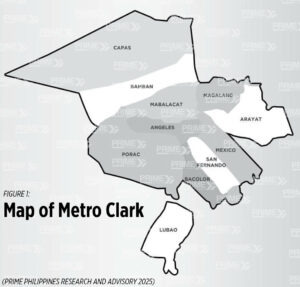Metro Clark, encompassing strategic parts of Pampanga and Tarlac, has swiftly transformed from a former US air base into one of the Philippines’ most dynamic growth corridors. Geographically positioned at the center of Luzon, Metro Clark provides extensive access to adjacent provinces, particularly toward northern provinces such as Nueva Ecija, La Union, Zambales and Ilocos Norte. Furthermore, Central Luzon, excluding Metro Manila, is the second most populous region in the country, offering a substantial talent pool that fuels its economic growth.
Clark Development Corp. recorded a 22-fold increase in approved investments in 2024 compared to 2023
This momentum is evident in the remarkable investment performance of Clark Development Corporation (CDC). In 2024, CDC recorded investments amounting to P77 billion. An estimated 60% to 70% of these commitments are expected to catalyze significant construction activities, directly benefiting sectors such as renewable energy, semiconductors, electronics, pharmaceuticals, medical devices, green minerals, agriculture, and steel. CDC further secured P35.6 billion in investment pledges in 2024, a 22-fold surge in approvals, reflecting sustained investor confidence in Clark’s economic potential.
The government has facilitated world-class infrastructure and unparalleled connectivity in Metro Clark
Infrastructure has played a foundational role in shaping Metro Clark’s competitive advantage. The government, led by the Bases Conversion and Development Authority (BCDA), has strategically partnered with the private sector to accelerate development. This is exemplified by collaborations with Filinvest, South Korea’s National Agency for Administrative City Construction (NAACC), and Japanese entities including Kansai Electric, Chubu Electric, and Marubeni Corporation — key contributors to New Clark City’s planning and development.
Clark International Airport, managed by the LIPAD consortium (Filinvest Development Corp., JG Summit Holdings, Changi Airports Philippines, and Philippine Airport Ground Support Solutions), further strengthens the region’s world-class infrastructure. Its modern facilities — featuring contactless check-ins, efficient baggage systems, and award-winning design — position Clark as a gateway of choice for international and domestic travelers.
Complementing air access is robust land connectivity. The Subic–Clark–Tarlac Expressway (SCTEX) directly links Clark to the Subic Bay Freeport Zone, forming a vital corridor for manufacturing and logistics activities. Southbound, North Luzon Expressway (NLEX) enables direct expressway access from Metro Clark to Bulacan and Metro Manila. Forthcoming projects like the Subic-Clark Railway and Malolos-Clark Railway are expected to significantly improve freight mobility and open new investment corridors along their routes as well.
Various investment promotion agencies facilitate a business-friendly environment with a heavy arsenal of incentives
This connectivity and infrastructure backbone is matched by a highly competitive business environment. Investors in Metro Clark benefit from minimal bureaucracy, with no local political interference and streamlined administrative procedures. In its economic zones, foreign enterprises are granted 100% leasehold ownership and operational control. Further bolstering its appeal are fiscal incentives from investment promotion agencies such as CDC, Philippine Economic Zone Authority (PEZA), and Board of Investments (BoI), including income tax holidays, duty-free importation, VAT zero-rating, and deductions for labor, training, and R&D.
Pampanga and Tarlac commanded 32% of warehousing requirements in Q1 2025
Supporting this confidence is the area’s notable performance in warehousing demand. Pampanga and Tarlac accounted for 32% of national warehousing requirements in the first quarter of 2025, underscoring the shift toward Central Luzon’s strategic location. Pampanga alone represented nearly 20% of total demand, surpassing even Metro Manila due to multiple large-scale requirements ranging between 25,000 and 77,000 square meters (sq.m.).
Within Metro Clark, northern cities such as Mabalacat and Angeles have emerged as high-priority locations for locators. Strategically situated along NLEX, both cities offer direct connectivity to Metro Manila, Subic Bay, and Northern Luzon.
Expanding pipeline underscores market optimism for Clark’s industrial future
A robust supply pipeline underscores continued market optimism. Notable developments include the 8-hectare Mabalacat Industrial Park and a 10,000-sq.m. warehouse in Bundagul, Mabalacat.
Moreover, specialized industrial estates are expanding Clark’s appeal to heavy manufacturing and logistics operations. The recently opened Filinvest Innovation Park – Phase 1 offers tailored facilities for logistics and export-focused firms. Concurrently, in New Clark City, the BCDA is establishing a 100-hectare sustainable, innovation-driven industrial hub. Additionally, a pharmaceutical manufacturing hub of 15 hectares, developed in partnership with the Department of Trade and Industry (DTI), will cater to both local and international pharmaceutical and medical device companies.
Clark’s industrial surge moves in step with broader urban development
Parallel to industrial expansion, Metro Clark’s residential, retail, and leisure sectors are experiencing significant growth. Upcoming residential projects such as BCDA’s affordable housing in New Clark City and SM’s Now Residences condominium in Angeles highlight increasing livability. Retail developments featuring global brands like Uniqlo and Nike, alongside the anticipated opening of Filinvest Mimosa Mall, enhance the region’s urban sophistication. Additionally, major hospitality investments — including the presence of international-standard hotels such as Marriott, Swissôtel, and Hilton, as well as expansions from Hann Casino Resort, InterContinental Clark at Hann Reserve, Banyan Tree, Wyndham Garden Clark, and Belle Corp. — underline Metro Clark’s growing reputation as a premier destination for business and leisure. These flourishing sectors collectively position Metro Clark as an integrated economic ecosystem poised for sustained, long-term prosperity.
Jet Yu is the founder and chief executive officer of PRIME Philippines, a commercial real estate advisory firm.
